 Many thanks to my guest, today, children’s author, Kate Simpson, who is the guinea pig for my restyled interview format – Show and Tell. And given Kate’s background in science, I’m predicting that she’s happy to be part of my experiment!
Many thanks to my guest, today, children’s author, Kate Simpson, who is the guinea pig for my restyled interview format – Show and Tell. And given Kate’s background in science, I’m predicting that she’s happy to be part of my experiment!
So, this is how it works: I ask Kate to SHOW us her books and then TELL us about them, herself and how they came to be published. Easy, right?
But first an intro…
It’s been a big month or so for Kate Simpson. Not only has her latest book, Anzac Girl, with Jess Rackyleft been released, but her picture book with Ronojoy Gosh, Dear Grandpa, was awarded a CBCA notable book! Congratulations, Kate! Apart from writing for kids (she has three published picture books) you may also know Kate as one third of the One More Page podcast crew.
So Kate, can you please SHOW us your books and introduce them to us.
Thanks Debra, I’d love to... Anzac Girl: The War Diaries of Alice Ross-King is the true story of sister Alice Ross-King who sailed to war in December 1914 and became the most decorated woman in Australia. Dear Grandpa is a CBCA Notable picture book about the special relationship between a boy and his grandfather. Through letters sent across thousands of kilometres, Henry and his grandfather find ways to keep their bond strong despite the distance between them. And in Finding Granny, Edie’s world is turned upside down when her beloved grandmother suffers a stroke. With Granny’s new frailty leaving her unable to do many of the things she and Edie used to enjoy together, the two must find different ways to connect.
Now for the nitty gritty: Kate Simpson, please tell us…who are you?
Wow, I didn’t know we’d be getting so spiritual so quickly. I ask myself that same question often late at night. Oh, you wanted the Wheel of Fortune introduction? Well, in that case, I’m a chemical engineer with a full-time day job in the water treatment industry, a mum, a podcaster and a picture book writer. I speak fluent French and not terribly fluent Spanish – ¡Hola!. I love board games and escape rooms (and books of course). I hate brioche.
Tell us… why do you write for children?
I love kids books. I never really grew out of them and when I had my own children I plunged right back in. I find a sense of wonder in kids books that is often missing in books for adults. I also love the craft of writing picture books – the fun you can have with language and the challenge of telling an entire story in (usually) fewer than 400 words.
 Tell us… Where did you go to learn about crafting stories?
Tell us… Where did you go to learn about crafting stories?
So many places! I started out with a book called Writing Picture Books by Ann Whitford Paul. It was a great, practical guide and I would definitely recommend it for anyone just starting out as an aspiring picture book writer. I’ve also taken a variety of short courses through Writing NSW and the Australian Writers Centre, as well as workshops at writing festivals. But for me, the most valuable step I took was to join a critique group. My writers group at Writing NSW is absolutely the reason that I am published today. When I first joined the group, we had one published member and one with a book under contract. The rest of us were unpublished. Now we have well over a dozen published books between us and many more under contract. Finding a critique group that was a little ahead of me in terms of craft was incredibly helpful. As well as providing valuable critiques of my work, my critique group was able to point me in the direction of publishers who were open to submission, picture book writing competitions, online groups and other resources to help me along my writing journey. I have also been part of a few online critique groups over the years, which have also been a fantastic help, but these days I find I only have time for one.
Tell us…When did your stories get picked up for publication
My first published picture book is called Finding Granny, and it was picked up as a result of a live pitching event at the Writing NSW Kids and YA Festival in 2016. Essentially I had about 60 seconds to pitch my story to a panel of 3 judges in front of a room full of people. It was absolutely terrifying (and I’m not normally put off by a bit of public speaking), but I was thrilled when I won the competition. The prize on the day was a book pack, but the real prize was that I decided to write to one of the judges to see if she’d be interested in seeing the full manuscript. The rest is history.
 Tell us… How was the process working with publishers and illustrators?
Tell us… How was the process working with publishers and illustrators?
I have absolutely loved working with publishers and illustrators. They’re book people – what more is there to say? Everything is so collaborative and everyone just genuinely wants the book to be the best it can be.
My publishers have both consulted me when choosing the illustrator, including showing me concept sketches before the illustrator is formally agreed to. I think this is really important because it gives me confidence that the illustrator, the publisher and I are all on the same page as to broadly how the book will look. And when it comes to the details, honestly, I feel a bit out of my depth even commenting, so unartistic am I. The only time I really have much to say is when I think the illustration really clashes with the text or isn’t telling the story as I see it. And so far, I’ve found the illustrators to be quite amenable to change on that front.
As for the editing, my experience has varied from very little editing through to changing almost every line. For my most recent book, Anzac Girl, the driver for a lot of the editing actually came from me. Everything takes so long in picture book publishing, and it had been quite a while between writing the manuscript and having it returned to me for the edits. Seeing it again with fresh eyes allowed me to suggest some edits of my own, which the editor was really supportive of.
Of my three books, the one that was subject to the most editing was Dear Grandpa. When I first submitted to Allen and Unwin, they showed quite a bit of interest, but asked me if I’d consider re-writing the ending, as it wasn’t quite working. I resubmitted, and although the publisher was delighted with my revisions, they now felt there was something not quite right with the beginning. There is now not a single page of Dear Grandpa that is unchanged from my first submission to Allen and Unwin. Most pages bear little resemblance at all to my original manuscript, except that they start Dear Grandpa and end Love, Henry, but hopefully the original spark is still there, polished to a shine by the various changes.
Tell us… w hat have been the ups and downs of being a children’s author, and what are your 3 top tips for aspiring/emerging writers?
hat have been the ups and downs of being a children’s author, and what are your 3 top tips for aspiring/emerging writers?
Ooh, two questions in one. Sneaky!
Happily for me I think it’s the ups that I remember the most. For me the biggest ups tend to be the things that come a bit out of the blue. For example, for my first book, Finding Granny, I found the book on-line quite unexpectedly (I mean, yes, I googled it, but I hadn’t actually expected to find anything) and it was probably the biggest thrill of my life. I’ve also quite recently had the delight of discovering that Dear Grandpa has been listed as a Notable Book by the Children’s Book Council of Australia. Wow!!
As for the downs, I actually feel like this has become more difficult since I’ve become published because my expectations of myself and what I can achieve have jumped dramatically. Before I was published, the goal of publication seemed really quite unlikely and the years of rejection felt like just part of the process. But from the moment I had my first manuscript accepted for publication, I suddenly (and quite unrealistically) expected so much more of myself and my career trajectory, and I started to feel the stings more keenly. I also find it harder to write now because I judge my work more harshly than I did before publication. Previously I could look at it as just a story I was writing. Now I imagine it being read by possibly thousands of people and it really dents my confidence.
My three top tips for aspiring writers are:
1. Join a critique group. If the first one you try isn’t right, try another one.
 2. Have faith in yourself and in your story, but be open to constructive criticism as well. (Part b of this tip is that you don’t have to accept every piece of constructive criticism that comes your way. It genuinely might not work for your story. But try to consider it with an open mind before rejecting it.)
2. Have faith in yourself and in your story, but be open to constructive criticism as well. (Part b of this tip is that you don’t have to accept every piece of constructive criticism that comes your way. It genuinely might not work for your story. But try to consider it with an open mind before rejecting it.)
3. Surround yourself with other writers to share your journey. Some of these will be members of your critique group, but you can also find people online, at writing courses or sometimes in places you’d least expect (I discovered one of my good writing buds at my kid’s school). Writing can be a rocky road emotionally. You will need this support.
And can you please also tell us… Does your interest in science influence what you write?
Good question. I would say that it definitely flavours what I write…but not for every book. Two of my three published books are not sciencey at all. But I’ve loved books and science in equal measure since I was a kid and if I can combine the two, so much the better! In my book Dear Grandpa, Henry is as wild about science as I am, and I think I channelled a lot of myself (or at least that aspect of myself) into the character of Henry.
My first (not at all sciencey) non-fiction picture book is Anzac Girl, which tells the story of my great-grandmother Alice Ross-King and her experience as a WWI nurse. Since writing Anzac Girl, I’ve actually been inspired to write more non-fiction and last year I tried my hand at a science-based non-fiction picture book. It’s currently on submission with my publisher, so cross your fingers for me – I hope it will make it into the world in the not too distant future (we’re talking in publishing terms here, so I’m thinking a couple of years).
 And what about being a member of the One More Page Podcast crew – has it helped your writing career?
And what about being a member of the One More Page Podcast crew – has it helped your writing career?
I often get asked this question and I find it really hard to answer. Was I published because of my podcast? No. My first contracts with each of my publishers came about before One More Page was launched. Have I sold more books because of my podcast? I’ve no idea. Probably? I think? But how big the impact has been I genuinely don’t know. I’m guessing it’s less than you might imagine. To me the biggest benefit of One More Page is that I have the unbelievably amazing opportunity of regularly knocking on the doors of people I admire to ask them all the things I want to know about kids’ books: writing them, publishing them, marketing them, selling them. It’s a truly incredible opportunity and one that I am immensely grateful for.
Thanks so much for that informative interview, Kate! You’ve given such a wonderful insight into your writing and publishing world.
If you want to find out more about Kate Simpson you can find her online at:
https://www.katesimpsonbooks.com
https://www.facebook.com/katesimpsonbooks
And you can find me online at:
https://www.facebook.com/debratidballpage









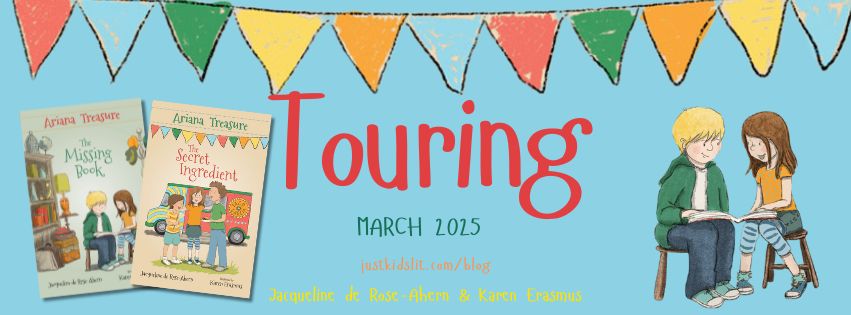
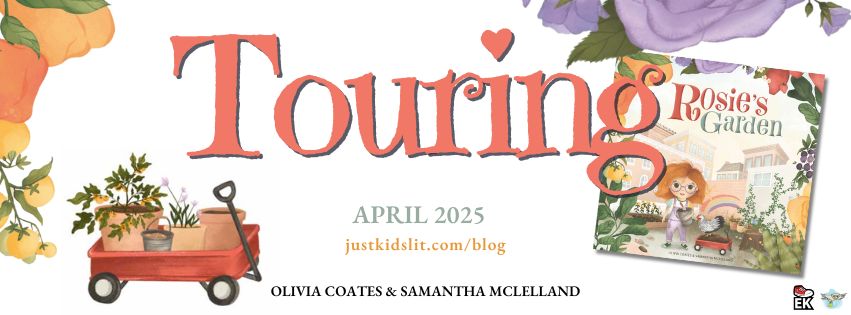
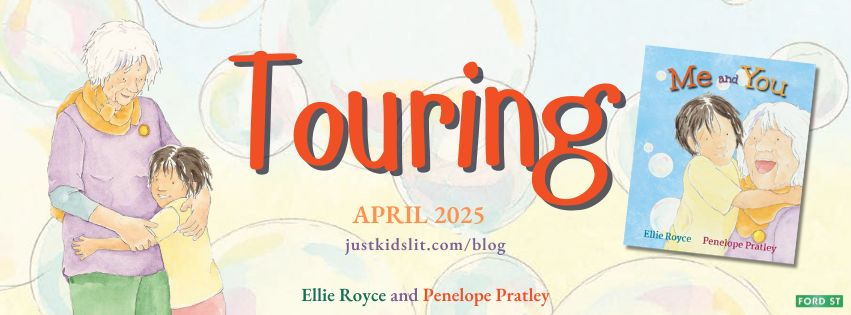
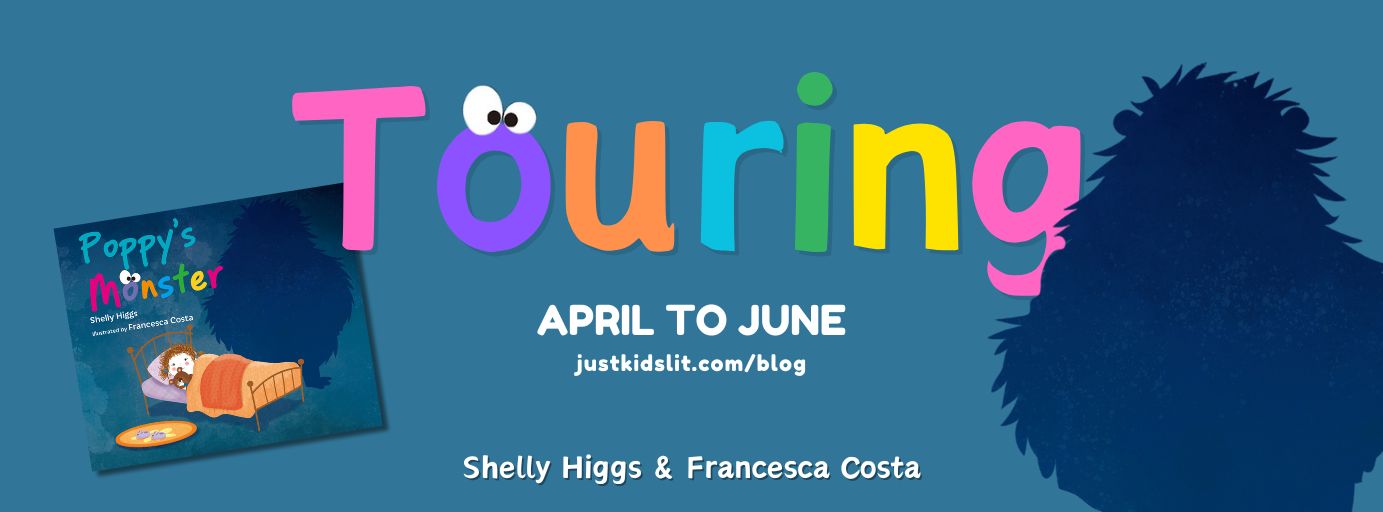
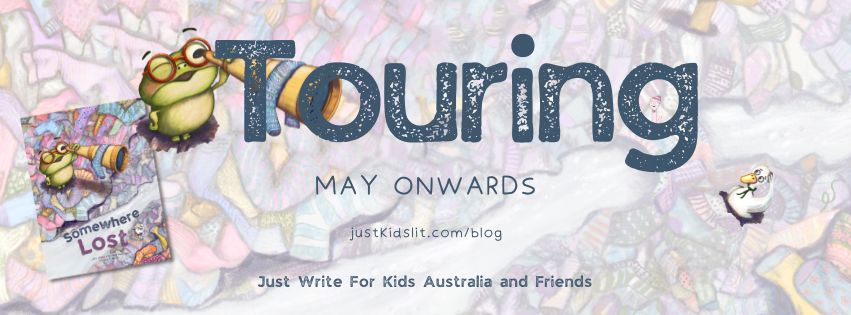





2 thoughts to “Show and Tell with Kate Simpson”
A really enjoyable interview and thanks Kate and Deb for sharing! Marg Gibbs
Wonderful, insightful interview! Love the new format. And I couldn’t agree more with the advice to join a critique group – I’m winking at you, Debra 😉 Congratulations to Kate on her amazing picture books.